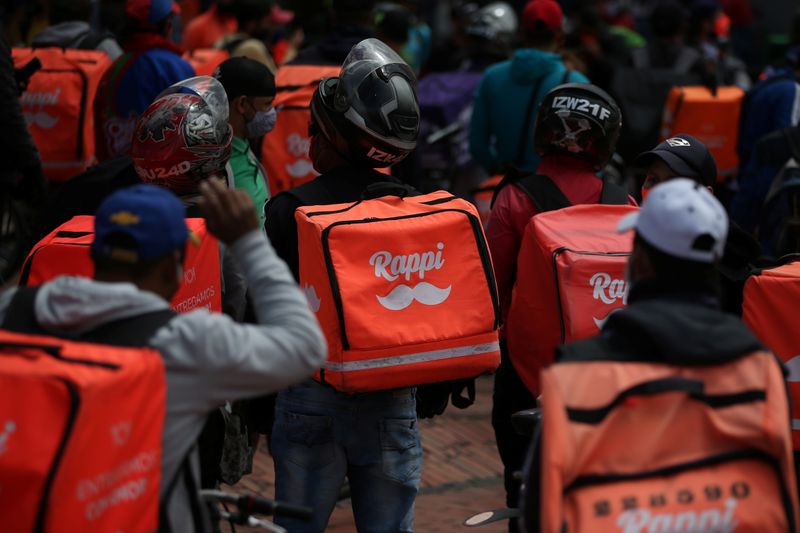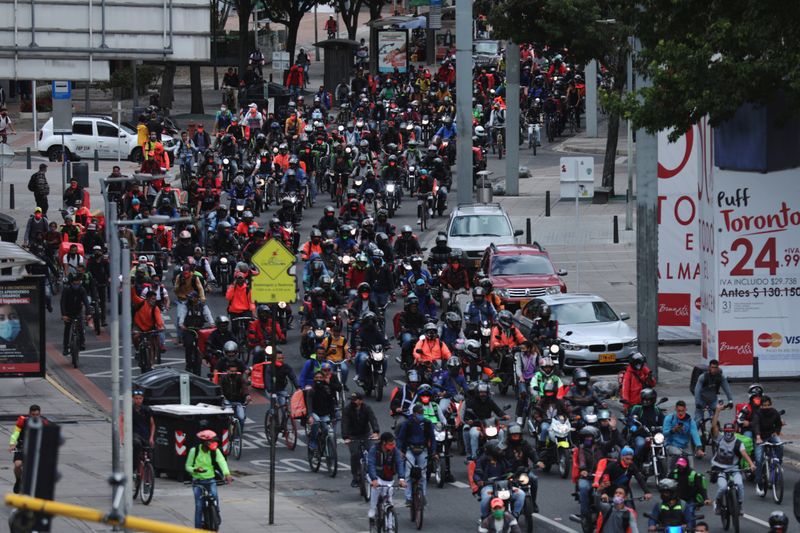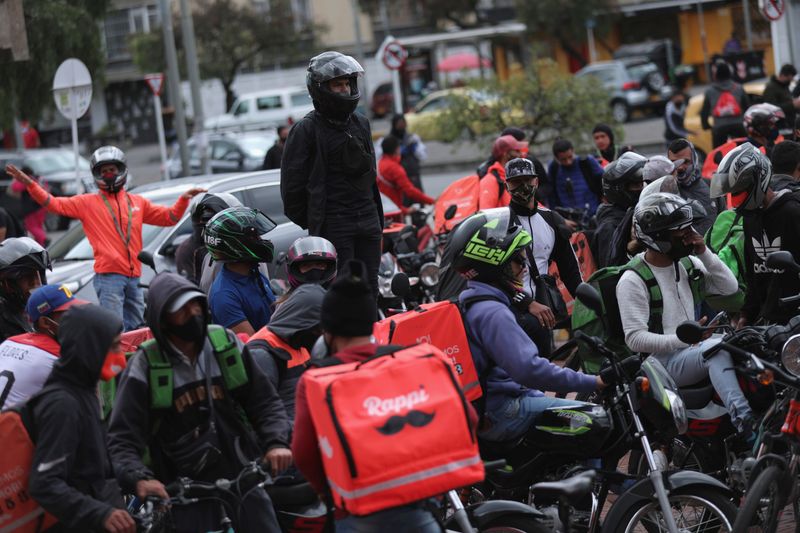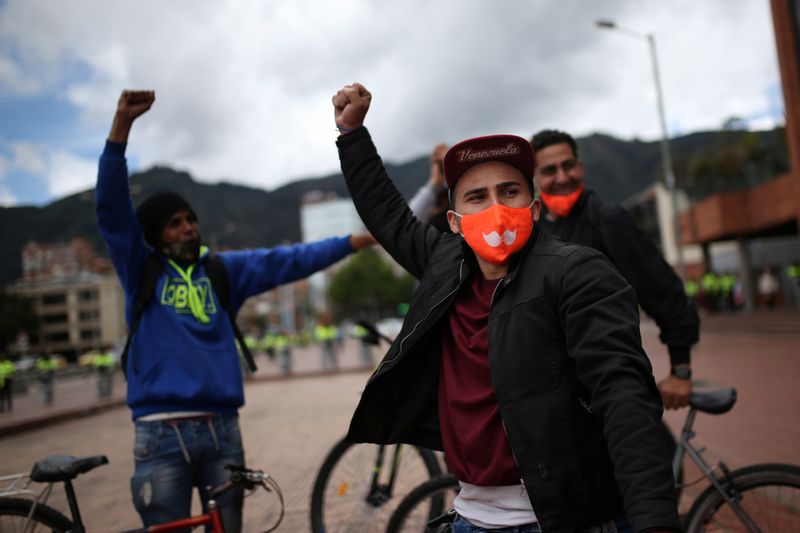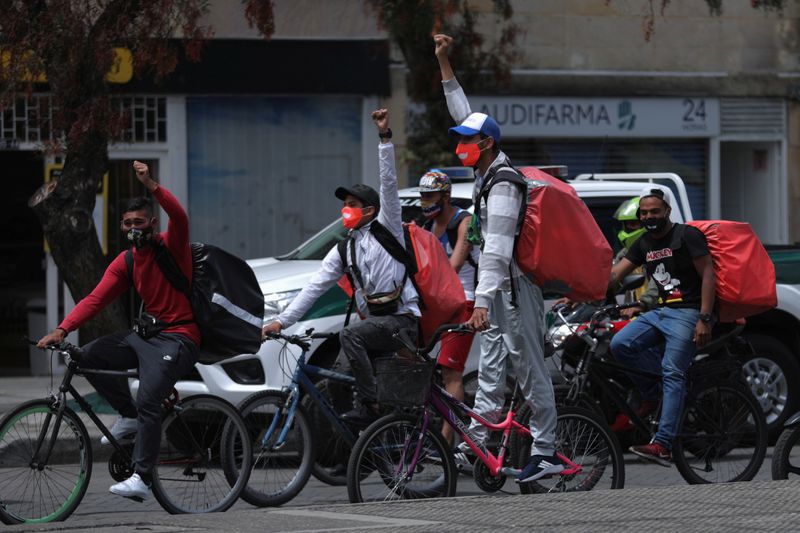BOGOTA (Reuters) – As Rappi has grown in Latin America, particularly in its home country of Colombia, so too has a shadow market for the all-purpose delivery firm’s worker profiles.
Rappi, a play on “rapido” the Spanish word for fast, has gained some 150,000 active contractors known as “Rappitenderos” and $1 billion in backing from Japan’s SoftBank <9434.T> since it was founded by three entrepreneurs in 2015.
But in a country where urban unemployment jumped to nearly 25% in July, up from just over 13% in March following coronavirus restrictions, and more than a quarter of the population lives in poverty, work as a Rappitendero is highly sought after.
Against this backdrop a black market where fake profiles are sold for as much as $160 apiece has emerged, including on social media platforms such as Facebook.
Rappi told Reuters it “strongly condemned” any black market in its worker accounts. Facebook referred to its terms of use, which state that job posts must not promote illegal activity.
SoftBank <9984.T> declined to comment.
Rappi also said in a statement that it has a dedicated fraud team monitoring illicit activities and is building a tool alongside police to verify worker accounts in real time.
Reuters spoke to more than a dozen Rappitenderos in Colombia, where some 50,000 work, who said there was a roaring black market trade in profiles. Four said they had bought one of these accounts themselves.
“I had to buy an account. I’m the head of my household. I have my son, I have a wife,” said one, who spoke on condition of anonymity for fear of repercussions.
All the Rappitenderos, many of whom are Venezuelan migrants, said the black market was fueled by cancellations of their profiles by Rappi, with people now paying to be able to work.
Under Rappi’s terms and conditions, messenger accounts can be blocked for violence against retailers, customers and other Rappitenderos, incorrect conduct when using the app and failing to maintain a high standard of service, among other reasons.
Gabriel Carvallo, a Venezuelan migrant who is a mechanic by trade said that one day he had been working on Rappi deliveries without problems, but when he tried to log on the next day, he found his account had been frozen. “I received the same message as everyone else ‘your account is blocked for (breaking) terms and conditions’ – they don’t write, or warn you, or send you an email,” he said.
Rappitenderos in Bogota recently called a one-day strike to protest against such blockages and a points system which determines who can work in areas of high demand.
The Bogota-based company denied that any accounts had been blocked without justification, adding it had canceled 5,600 accounts in Colombia since March, of which 1,060 were due to “false identity issues”, a spokeswoman confirmed.
It was not immediately clear who would investigate the trade in Colombia, where a spokesperson for Bogota police said fake accounts were a matter for regulators.
The Superintendency of Industry and Commerce, which last year found Rappi failed to comply with orders to improve responses to complaints, advised contacting the police.
Sales of Rappi accounts are not confined to Colombia. In Mexico, three people close to the matter told Reuters the practice was common. Accounts for sale for rivals Uber Eats and iFood also appeared on social media in Colombia and Brazil.
Brazil-based iFood said in an email response to Reuters that passing accounts to third parties violated its terms and conditions. Uber Eats said in a statement it is constantly strengthening its systems to avoid account sharing or renting.
YOURS FOR $160
While signing up officially to Rappi is free, Rappitenderos told Reuters that secondary accounts are typically offered by opaque contacts on Facebook groups, WhatsApp accounts and even by people in the street for $65 to $160 each.
Sometimes people who are not working as Rappitenderos are paid to set up profiles before passing them on, two of the workers said.
One person purporting to sell Rappi profiles, contacted by Reuters via WhatsApp, boasted in an automated reply of selling more than 300 profiles over three years.
A person responding to messages to a second WhatsApp account said their clients had no problem working via the Rappi application once an account had been purchased.
Reuters could not verify if the accounts were connected or how many accounts they had sold.
As well as offers to sell Rappi accounts, dozens of Facebook posts across multiple group pages advertise services for users, such as changing registered modes of transport from bikes to motorcycles or cars.
One woman who said she had worked for a year selling upgrades and other services to those with black-market accounts, described the secrecy involved.
“You’re never close to, or know the person, who makes changes in-app,” she said. “I don’t know how that’s handled. No one knows if it’s someone in the office, or someone hacking. Many of us aren’t interested in who does it – that’s irrelevant.”
(Reporting by Oliver Griffin in Bogota; Additional reporting by Daina Beth Solomon in Mexico City: Editing by Christian Plumb, Julia Symmes Cobb and Alexander Smith)

